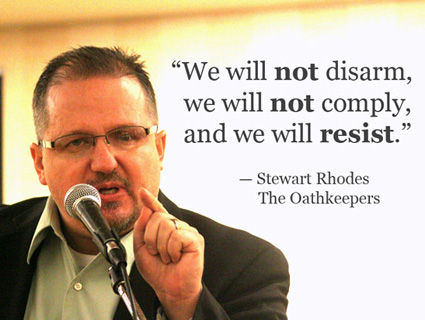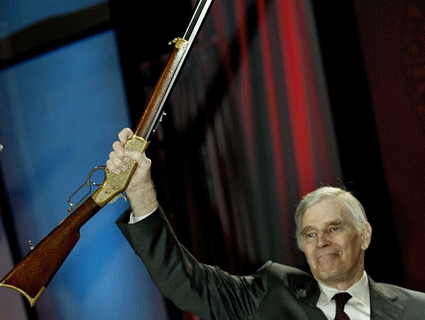
Rep. Steve Stockman (R-Texas). <a href="http://www.youtube.com/watch?v=ATi7ZJVgCNQ">Fox News</a>/YouTube
On Monday of last week, Rep. Steve Stockman (R-Texas) announced that if President Barack Obama attempted to enact new gun violence prevention measures through executive order, he would have no choice but to file articles of impeachment. By Tuesday, he was comparing Obama to Saddam Hussein for using children as props at a speech introducing a gun control package. By Wednesday, he had stepped back from the precipice, asserting that “impeachment is not something to be taken lightly.” After all, where did anyone get that idea?
This is the way it has always been with Steve Stockman: Light a fire; add some potassium nitrate; then stand back and gawk at the crater.
The Texas congressman, who is three weeks into his second term after a 16-year hiatus from the House, is almost certainly the only member of Congress to have been caught with 30 mg of valium hidden in a cellophane wrapper in his underwear. He’s defended militia groups; accused an attorney general of “premeditated murder”; appeared on a Holocaust-denying radio program; waged a one-man war against Alfred Kinsey; compared his constituents—favorably—to Branch Davidians; and traveled to Denmark to protest climate change while wearing a red blindfold. The man who bested his 2012 opponent by 44 points isn’t the most ballyhooed of incoming lawmakers. He’s just the nuttiest.
Stockman’s first congressional victory, a 1994 upset of 42-year incumbent Jack Brooks, may have been the closest his state ever came to electing a gun. In the preceding years, Stockman had experienced a personal purgatory—the aforementioned Wisconsin drug bust, which he blamed on his girlfriend; a brief period as a “studerino” (his words) surrounded by “hot-looking babes”; myriad bounced checks; a falling out with his brother; and a year living in a Forth Worth park with another homeless man he compared to Lennie from Of Mice and Man. Then Stockman discovered Christ and Ronald Reagan in East Texas.
While making just $11,000 a year as an accountant (if his financial disclosures were to be believed—which, according to his opponents, they weren’t) Stockman poured his energies into local Republican causes. He lost House races in 1990 and 1992, but hit the jackpot during the Gingrich Revolution of 1994. The deciding issue was assault weapons. Brooks, a longtime National Rifle Association booster, had voted for President Bill Clinton’s ban—the “scary weapons ban” in Stockman’s parlance—and that made Brooks a target. The Virginia-based Gun Owners of America came to Stockman’s aid; so did the NRA. Stockman also bashed Brooks for his support of the 1993 raid on the Branch Davidian compound in Waco, which left 76 people dead.
Trying to beat back the gun-rights-fueled assault, Brooks highlighted Stockman’s apparent habit of falsifying his resume. Stockman had touted himself a graduate of the University of Houston before he had graduated, and he had claimed to have worked as a consultant for the university for five years, though the school said it had no record of such a gig. Brooks also hinted not-so-subtly that Stockman was gay, running an ad alleging that he had operated a studio in a neighborhood in Houston known for its nude modeling studios.
Stockman, who has been married to his wife, Patti, since 1988, told the Galveston Daily News that he did have an interest in ceramics—”but don’t say that or they’ll think I’m a fag for sure.” He credited the smear campaign with boosting his image: “I had almost zero name recognition until he started running all those ads accusing me of all sorts of things, including being a homosexual.”
Once in Congress, Stockman wasted little time advancing his agenda. He filed legislation to repeal provisions “relating to semiautomatic assault weapons and large-capacity, ammunition-feeding devices” (i.e. assault weapons), declaring that “gun control is dead.” He proposed forcing all members of Congress to live in dorms (an idea he still supports) and led a mini-insurrection against Speaker of the House Newt Gingrich over spending cuts. Stockman was a rising star.
Then, in April of 1995, the Oklahoma City bombing happened. According to news accounts a few days after the attack, Stockman’s office had received a cryptic fax minutes before the detonation, alluding to a major incident in Oklahoma: “First update. Bldg 7 to 10 floors only. Military people on scene—BATF/FBI. Bomb threat received last week. Perpetrator unknown at this time. Oklahoma.” The fax, the news stories said, had been sent to Stockman from a prominent Michigan militia leader, and rather than report it directly to the proper authorities, Stockman’s office had sent it to the NRA—before handing the FBI a copy two days later.
That story was wrong. As it happened, Stockman had sent the fax to the FBI almost immediately after receiving it, and the letter had been faxed after the attack. (Someone at his office had just forgotten to reset their machine for daylight savings time.) But the decision to send the memo to the NRA was curious, as was the fact that Stockman was receiving correspondence from someone with ties to a militia. His Oklahoma City fiasco might have been written off as bad luck were it not for two other documents that appeared around the same time.
First, a month before the bombing, Stockman and a handful of other Republican congressmen wrote to Attorney General Janet Reno urging her to consider what he called an “impending raid” on militias. He had specifics. According to Stockman, the Bureau of Alochol, Tobacco, Firearms, and Explosives, and a US Army unit called Joint Task Force Six were planning on launching a “paramilitary-style attack against Americans” at 4 a.m. on either March 25 or 26, 1995. The result, Stockman warned, could be a “bloody fiasco like Waco.”
The problem: According to the Department of Justice, there was no such raid in the works. The Army unit in question was working on border security. Stockman was cagey about the source of his information, attributing it to “a number of reliable sources.” But before he sent the letter, militia and NRA message boards had been bubbling over with rumors of a crackdown.
Stockman’s chief of staff, in a rather unhelpful attempt at damage control, told reporters, “There are things within the militias that we would certainly agree with and there are things in the militia [movement] we would not agree with.”
After the news of the Reno letter leaked, Guns & Ammo magazine published an essay Stockmann had penned for its June issue. In it, he alleged that the Waco siege was part of a government plot to generate momentum for an assault weapons ban. “Waco was supposed to be a way for the Bureau of Alcohol, Tobacco and Firearms and the Clinton administration to prove the need for a ban on so-called ‘assault weapons,'” Stockman wrote.
Reno, he argued, should have been charged with “premeditated murder” and the cult members at David Koresh’s compound had been “executed.”
“These men, women and children were burned to death because they owned guns that the government did not wish them to have,” he wrote. To put it in perspective, Stockman said, “The average Texan in my district owns more firearms than did the average Branch Davidian.”
Although he’d sent in a draft in February, the article appeared in print immediately following the Oklahoma City bombing. “A few things could have been said a little better,” he conceded afterwards. Stockman also blamed an anonymous staffer whom he said had written portions of the article.
(Not coincidentally, that May, Roll Call reported that Stockman had finished in third in a “Boss From Hell” survey of Hill staffers; five staffers left in his first four months in office, at least one out of protest over a mandatory morning prayer policy.)
A congressman for all of five months, Stockman was now everyone’s new favorite target, and he didn’t do himself any favors. Next, he came under fire from the Anti-Defamation League after going on a radio show run by a pro-militia conspiracy theorist group called the Liberty Lobby. Stockman rejected the ADL’s assertion that the Holocaust-denying radio show was anti-Semitic. “They said that because they talk against ‘international bankers’ that means they’re against Jewish folks,” he told Jewish Week. “I don’t agree…The largest banks today are not American. I know that most of them are Japanese now.”
Besides, he explained, he led by example. His own staff included “a Christian Jewish person.”
Stockman also came under scrutiny from the Federal Elections Commission. Although Stockman claimed to have been inspired to run for office by Oliver North’s testimony during the Iran-Contra scandal, there was another incentive he didn’t talk about. An Ohio direct marketing firm called Suarez Corp., angered by Brooks’ proposal to tax out-of-state direct marketing firms, had put out an ad in a local paper promising financial support for anyone who would run against him. They ultimately loaned the cash-strapped Stockman $82,000—then filed a complaint when he never repaid it; Stockman insisted he’d been given just $44,000.
But the FEC had its sights on more than just the Suarez Corp. money, though. The commission also launched an investigation into the Southeast Texas Times, a bimonthly newspaper was launched in advance of the 1994 election and disbanded shortly thereafter. Although Stockman claimed he had no connection to the newspaper, it served as a wing of the Stockman campaign; for one thing, it was published out of his house. (Stockman’s campaign headquarters was his two-car garage.) The direct line for advertisers was his home phone number, the masthead was filled with Stockman campaign volunteers, the advertisers were Stockman donors, and Stockman himself asked supporters to pay $26.50 to subscribe.
Headlines of copies obtained by Roll Call included red-meat tracts such as “Servicemen Don’t Want Sodomites in the Military” and “HUD Appointee is a ‘Mean Lesbian.'”
Publicly, Stockman lamented his misfortune. But he made no effort to change his behavior. That December, after watching a Family Research Council movie called Children of Table 34, about sex researcher Alfred Kinsey, he wrote a letter to his colleagues calling for a moratorium on sexual education: “Our children have been taught that…any type of sex is a valid outlet for their emotions. They are taught that the problem with sex is not that it is wrong to engage in homosexual, bestial, underage, or premarital sex, but that it is wrong to do so without protection.”
Stockman’s antics made him a top target of Democrats. They recruited Nick Lampson, a former tax collector, to quit his job and run for the seat. Stockman edged Lampson in the 1996 election, but just when he thought he was out of the woods, a federal court invalidated the election result on the grounds that Stockman had been illegally redistricted into a more favorable seat. A second election one month later—in a district containing more Democratic turf and less of what Stockman characterized as “beer, Bible, and guns“—went to Lampson.
For Stockman, the second coming—sandwiched around stints as a banker, a fiber-optics entrepreneur, and an anti-climate-science activist—has been much like the first. His 2012 campaign headquarters was a raccoon-infested motorcycle repair shop, and in true militia fashion, Stockman volunteers dined on MREs. Running on a tea party platform in the newly created 36th district, Stockman faced only token Democratic opposition in the form of Max Martin, a retired pilot, and took 71 percent of the vote.
Asked by the Dallas Morning News whom he could work with in Congress, Stockman singled out the one Texas Republican congressman who may just rival Stockman in the bomb-throwing department: “The Louie Gohmerts—I want to be a team player with them.”
He’s off to a good start.









